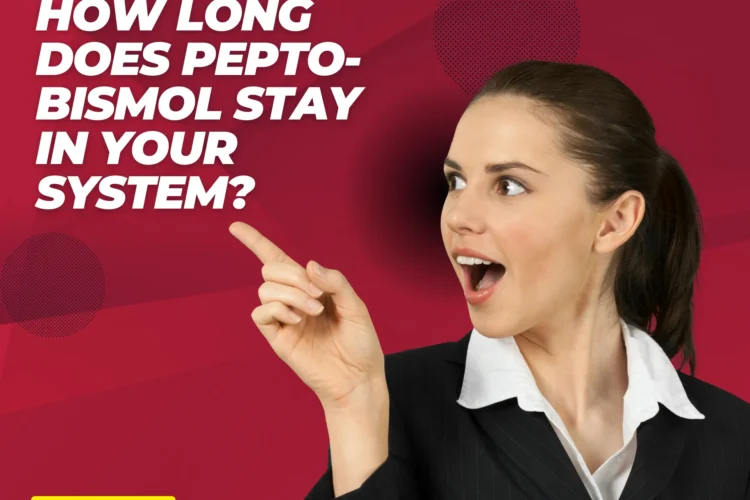Pepto-Bismol is a well-known over-the-counter medication that provides relief from various gastrointestinal discomforts, such as indigestion, heartburn, and nausea. It contains an active ingredient called bismuth subsalicylate, which is responsible for its soothing effects on the stomach and digestive tract. If you’ve ever taken Pepto-Bismol, you might be wondering how long it stays in your system and how it works. In this article, we’ll explore the mechanisms behind Pepto-Bismol, its absorption and elimination, and address frequently asked questions about its duration of action.
Understanding Pepto-Bismol’s Mechanism of Action
Pepto-Bismol’s primary active ingredient, bismuth subsalicylate, has both anti-inflammatory and antibacterial properties. It forms a protective coating on the stomach lining, helping to alleviate symptoms such as irritation and inflammation. Additionally, it can help to reduce diarrhea by slowing down the movement of fluids through the intestines.
When you consume Pepto-Bismol, the bismuth subsalicylate is broken down in the stomach into its components – bismuth and salicylate. Bismuth plays a role in forming a protective layer on the stomach lining, while salicylate has anti-inflammatory effects similar to aspirin. However, the levels of salicylate in Pepto-Bismol are much lower than those in aspirin, making it generally safer for stomach-related issues.
Absorption and Elimination
After you take Pepto-Bismol, the bismuth and salicylate components are absorbed into the bloodstream through the stomach and small intestine. The absorption process can take a variable amount of time and depends on factors such as your individual metabolism, the presence of other substances in your stomach, and your overall health.
Once absorbed, these components are distributed throughout your body, including the stomach lining and the mucous membranes of the digestive tract. The bismuth forms a protective layer on these surfaces, while the salicylate exerts its anti-inflammatory effects.
How Long Does Pepto-Bismol Stay in Your System?
The duration of Pepto-Bismol’s effects and its presence in your system can vary from person to person. On average, the effects of a standard dose of Pepto-Bismol can last for about 4 to 6 hours. This includes the time it takes for the medication to start working and the duration of its effects on your stomach and digestive tract.
As for how long Pepto-Bismol components stay in your system, bismuth has a relatively long half-life of around 5 to 9 days. This means it takes approximately 5 to 9 days for half of the ingested bismuth to be eliminated from your body. Salicylate, on the other hand, has a shorter half-life of around 2 to 3 hours.
It’s important to note that even though the effects of Pepto-Bismol might wear off after a few hours, trace amounts of bismuth and salicylate can still be present in your body for several days after taking the medication. However, these levels are usually not significant enough to cause any lasting effects or concerns.
In Conclusion
Pepto-Bismol is a trusted over-the-counter remedy for various gastrointestinal discomforts. Its active ingredient, bismuth subsalicylate, works by forming a protective layer on the stomach lining and providing relief from inflammation and irritation. While the effects of Pepto-Bismol typically last for 4 to 6 hours, trace amounts of its components can stay in your system for several days.
As with any medication, it’s important to use Pepto-Bismol responsibly and as directed. If you have any concerns about its use or potential interactions with other medications, it’s always a good idea to consult a healthcare professional. Remember that while Pepto-Bismol can provide temporary relief, addressing the underlying causes of your digestive issues is essential for long-term well-being.
Frequently Asked Questions About Pepto-Bismol
1. Can I take Pepto-Bismol every day?
Pepto-Bismol is generally safe for occasional use. However, using it every day for an extended period is not recommended unless specifically advised by a healthcare professional. If you find yourself needing to use Pepto-Bismol regularly, it’s important to consult a doctor to determine the underlying cause of your symptoms.
2. Can Pepto-Bismol interact with other medications?
Yes, Pepto-Bismol can interact with certain medications. It’s important to inform your healthcare provider about all the medications and supplements you are taking before using Pepto-Bismol, especially if you are on blood-thinning medications, have allergies to salicylates, or have any underlying health conditions.
3. Can I give Pepto-Bismol to my child?
Pepto-Bismol is not recommended for children under the age of 12 due to the potential risk of Reye’s syndrome, a rare but serious condition. Always consult a pediatrician before giving any medication to a child.
4. Can Pepto-Bismol cause side effects?
While Pepto-Bismol is generally well-tolerated, some individuals may experience side effects such as constipation, darkening of the tongue or stool, and ringing in the ears. If you experience any unusual or severe side effects, discontinue use and consult a healthcare professional.
5. Can I take Pepto-Bismol if I’m pregnant or breastfeeding?
Pregnant and breastfeeding individuals should consult their healthcare providers before using Pepto-Bismol. While bismuth subsalicylate is generally considered safe during pregnancy, it’s important to discuss any potential risks with your doctor.
6. Can I drive or operate machinery after taking Pepto-Bismol?
Pepto-Bismol is not known to cause drowsiness or impair cognitive function, so it’s unlikely to affect your ability to drive or operate machinery. However, if you experience any unusual side effects after taking the medication, it’s best to avoid such activities until you know how your body responds.



0 Comments